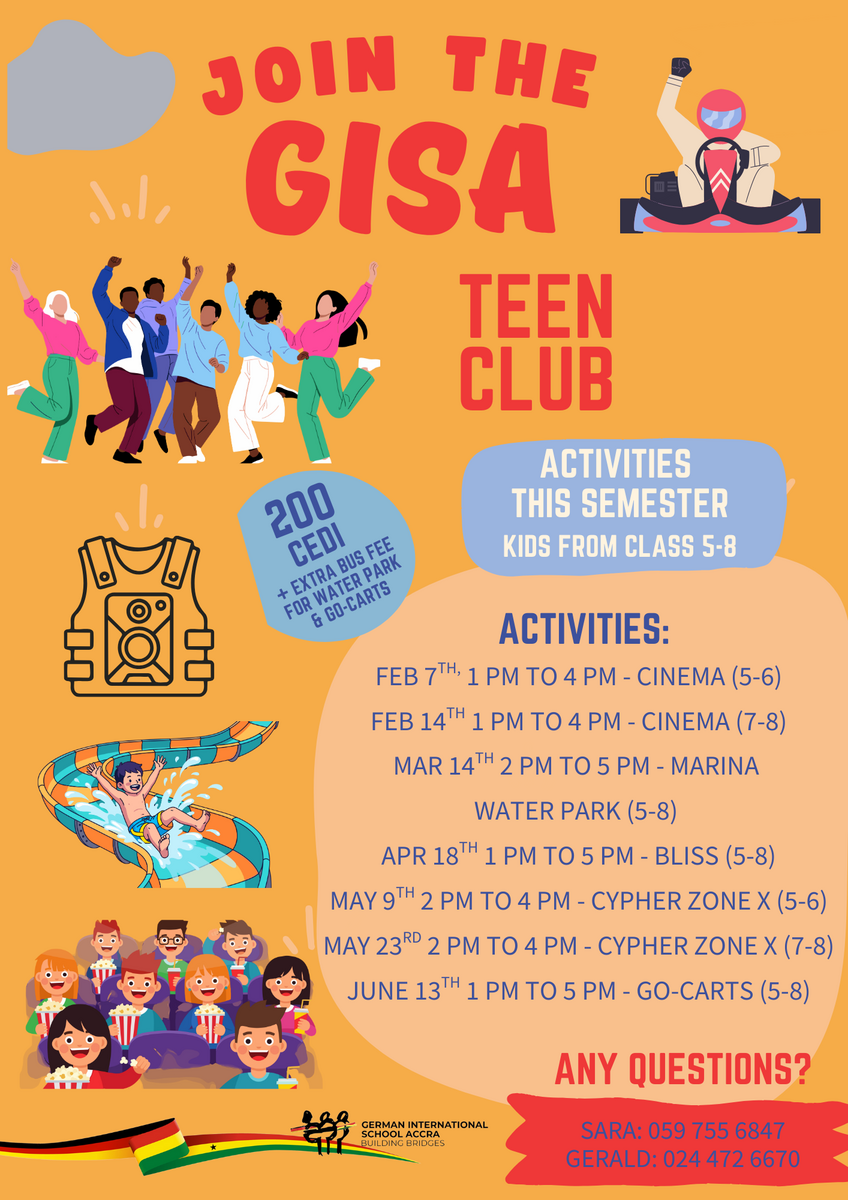GISA at a glance
Since 1966, the German International School (GISA) has been offering the opportunity for education in the Ghanaian capital Accra. Over the course of its eventful history, the educational institution operated under the names R.M.S. (Ramseyer Memorial School), Swiss School or German Swiss International School. GISA is the only recognized excellent German school abroad in West Africa, its closest neighbors are Addis Ababa (4,310 km), Cairo (4,273 km), Nairobi (4,180 km), Tenerife (3,040 km) and Windhoek (3,648 km). It is located in the heart of the vibrant metropolis of Accra, directly on the Ring Road Central and next to the Nima police station. About 130 children from more than 20 nations are taught and cared for by 7 educators (6 from Germany, 1 from Ghana) and 14 teachers (6 from Germany, 4 from Ghana, 1 each from Belgium, Kenya, Kongo and Switzerland) (as of the 2025/26 school year). The pedagogical team is being supported by interns, student teachers or social work students from Germany, recognized interns in the daycare center or via Kulturweit (volunteer service of the UNESCO Commission).
As an all-day school, lessons begin at 8 a.m. and end at 2.50 p.m. daily except on Fridays until 12.30 p.m. GISA also offers an attractive range of extracurricular activities with early supervision from 7 a.m. and until 4 p.m. in the afternoon (on Fridays until 2.30 p.m.).
There is the option of ordering a lunch from a catering provider (North Ridge Café) or alternatively bring a meal from home and have it warmed up by school staff. Camps are also offered during the vacation periods to provide high-quality care for the children (3 - 12 years). The curriculum begins with the nursery (from the age of 1), for which there is a weekly baby club. This is followed by a Kindergarten with pre-school, an primary school (grades 1 - 4) and a growing secondary school (school year 2025/26 up to and including grade 8; this means that the first intermediate diplomas will be awarded by 2028 at the latest, initially through a cooperative examination program with the German Embassy School Addis Ababa in Ethiopia). Further plans for the future include the introduction of an upper secondary school with the GIB (mixed-language international baccalaureate).
The Thuringian education plan serves as the basis for the educational work and the standards of the British Cambridge curriculum are also considered. GISA's vision is to “build bridges”, as the school sees itself as a link between Ghana, Germany and the world. This is also reflected in the guiding principles, the numerous collaborations, partnerships and a valuable supporting network, the bilingual profile, numerous cultural events and the opening of the school as a “school of encounter”.
Thanks to the expertise of highly qualified teachers of German as a foreign or second language, it is also possible for students with no prior knowledge of German to enroll at the school at any time. Great importance is attached to achieving a balance between high academic standards and plenty of room for creativity, physical activity, music and activity-oriented learning.
Small learning groups in mixed-grade classes ensure optimal teaching conditions. Extracurricular activities are regularly included and external experts are involved in the lessons.
The school's campus is designed as a “living space” for the children and teenagers, green and colorful. Classrooms and the kindergarten are cheerfully and creatively designed. The facilities, both analog and digital, meet German standards. Numerous specialist rooms for art, music, movement, a school kitchen, the canteen, a science lab, rooms for pre-school, one for English, a computer room and the library complement the attractive range of facilities. A playground, basketball court and football pitch encourage physical activity and can also be used for celebrations, cultural and sporting events.
GISA is jointly run by the parents, amongst whom a five-member board is elected at regular intervals. The German Embassy in Accra is also represented on the board. At the same time, the school is subject to supervision by the Central Agency for Schools Abroad (ZfA), the German Conference of Ministers of Education and Cultural Affairs (KMK) and the Federal Office for Foreign Affairs, which guarantees an excellent standard of education. The school is financially and personally supported by the Federal Republic of Germany through an award contract and annual funding agreements.





